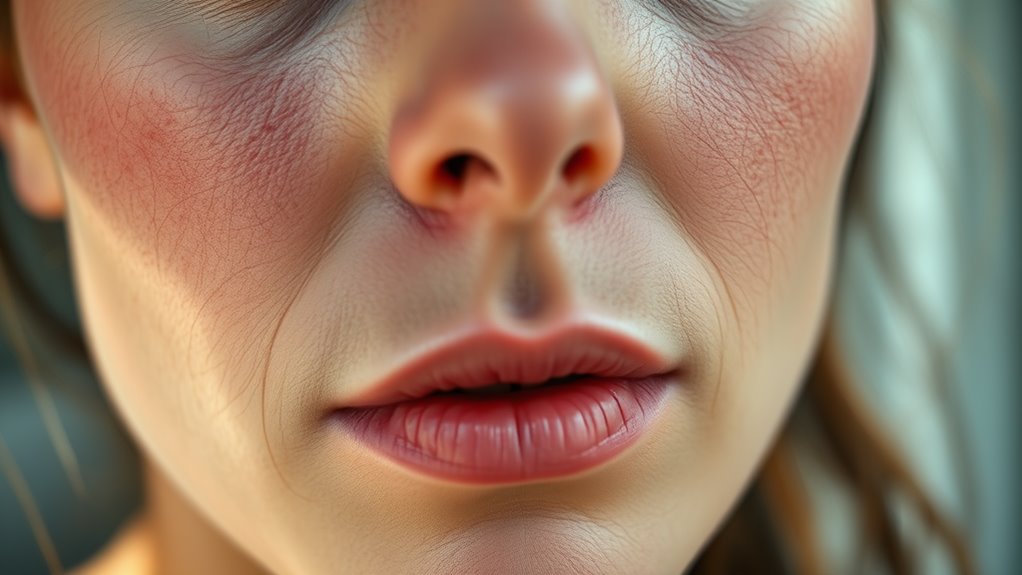What Happens If You Skip Moisturizer. I Tried It for a Week
If you skip moisturizer for a week, your skin’s barrier weakens immediately, leaving it feeling tighter and drier as water loss accelerates. Mid-week, you’ll notice increased flakiness, roughness, and itching from inflammation and disrupted lipids. By week’s end, redness and micro-cracks emerge, highlighting hydration’s role in maintaining integrity. This experiment underscores moisturizer’s necessity for skin health; explore ahead for detailed observations and reflections.
Key Takeaways
- Skipping moisturizer causes immediate tightness and dryness in the skin within the first day.
- By mid-week, increased dryness leads to inflammation, roughness, and flakiness.
- Daily observations reveal emerging itching and sensitivity as the skin barrier weakens.
- At the end of the week, micro-cracks and redness appear due to accelerated water loss.
- The experiment underscores the essential role of moisturizer in maintaining skin hydration and integrity.
Day 1: Immediate Effects
As you skip moisturizer on the first day, you’ll notice your skin feels tighter and drier right away. This classic skincare mistake compromises your skin’s barrier function, which normally locks in moisture.
Evidence shows that without emollients, the stratum corneum loses water rapidly, causing immediate discomfort and potential irritation. You’ll sense this as a pulling sensation, especially in drier areas like your cheeks or forehead.
Practically, this highlights how even one day of neglect can disrupt hydration balance, as studies in dermatology journals confirm that topical barriers prevent transepidermal water loss. Embracing a crucial tip from reliable sources can mitigate these effects.
By skipping, you’re essentially allowing environmental factors to exacerbate dryness, making your skin more vulnerable. As explored in various blog posts, this oversight often reveals common skincare mistakes that can lead to ongoing skin health challenges.
Mid-Week Skin Changes
By mid-week, your skin shows more pronounced dryness and potential inflammation as the initial barrier disruption worsens. You’ll notice increased tightness and a rough texture, as the stratum corneum struggles without hydration, leading to elevated transepidermal water loss. This disrupts lipid balance, making your skin more vulnerable to environmental irritants. This phenomenon is comparable to the moisture balance issues from overwashing, where ceasing regular routines can exacerbate skin problems.
| Symptom | Scientific Explanation |
|---|---|
| Increased Dryness | Reduced ceramide levels impair barrier function, accelerating moisture evaporation. |
| Mild Inflammation | Cytokine release triggers immune responses, causing redness from unprotected exposure. |
| Texture Changes | Desquamation slows, resulting in flaky buildup due to inadequate natural moisturizing factors. |
| Sensitivity Rise | Nerve endings become hypersensitive without the lipid layer’s protective role. |
Addressing this practically, you should monitor for these signs to prevent escalation, drawing from dermatological studies on barrier repair. Incorporating soothing routines can help alleviate these issues and promote overall skin comfort.
Daily Observations and Symptoms
Throughout the week, you track emerging symptoms as your skin’s barrier weakens without moisturizer, noting daily changes like increased dryness and sensitivity. This underscores one of the three common mistakes I eliminated for better skin health and appearance, drawing from my skincare revamp experience.
On day one, you feel initial tightness as hydration drops, per research on transepidermal water loss. By day two, flakiness emerges, making your skin feel rough and prone to irritation from environmental factors.
Mid-week, say day three or four, itching intensifies, as studies indicate unprotected skin reacts to allergens more readily. You observe redness creeping in by day five, a practical sign of barrier compromise, urging caution with activities like sun exposure.
Daily, you note these symptoms escalate, emphasizing moisturizer’s role in maintaining skin integrity through evidence-based observations. This experiment underscores the importance of avoiding skincare mistakes to achieve healthier skin, as per expert recommendations.
End-of-Week Skin Assessment
At week’s end, you evaluate your skin’s overall state, comparing initial symptoms to the cumulative effects observed. Throughout the experiment, dryness intensified, with your skin feeling increasingly taut and flaky, as daily neglect compounded barrier damage.
Scientifically, this reflects elevated transepidermal water loss, where the stratum corneum loses its protective function without emollients, leading to micro-cracks and heightened sensitivity.
Practically, you notice a rougher texture, subtle redness, and diminished elasticity, all measurable through basic assessments like visual inspection or a moisture meter.
These changes highlight how skipping moisturizer accelerates dehydration, emphasizing evidence from dermatological studies on hydration’s role in maintaining skin resilience and preventing long-term wear. By participating in this experiment, you directly challenge skincare myths that downplay the necessity of daily moisturization.
This experiment underscores the importance of addressing skincare mistakes to maintain radiant skin and prevent such deteriorations.
Reflections on Hydration Impact
Reflecting on this week’s experiment, you see how essential hydration is for skin health, as skipping moisturizer not only worsens dryness but also underscores research showing that consistent barrier support reduces transepidermal water loss and prevents damage. Furthermore, adopting a holistic approach to well-being can help alleviate stress, which in turn benefits skin health by reducing inflammation linked to skin issues. You’ve likely noticed how dehydration accelerates fine lines and irritation, backed by studies in the Journal of Investigative Dermatology, which link poor hydration to increased inflammation. Moreover, embracing increased water consumption has revealed transformative effects on skin appearance, as explored in hydration practices. Now, consider these key contrasts:
| Aspect | Impact on Skin |
|---|---|
| Moisture Retention | Decreases, leading to flakiness |
| Barrier Integrity | Weakens, heightening sensitivity |
| Elasticity | Reduces, causing visible aging |
| Long-Term Health | Raises damage risk if untreated |

